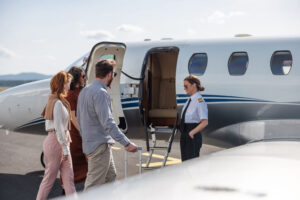Mental Health Counseling Can Help Your Pilot Medical
There may be 50 ways to lose your pilot medical, but thanks to a new service by MedAire, mental health issues may not necessarily be one of them. Heart attacks, Diabetes, Stroke, dementia…yes, but depression? Anxiety? Stress? Maybe not. And the way MedAire tackles mental health issues is brilliant.
MedAire’s new program, MedAire Wellbeing Service, has partnered with Odilia Clark, a risk management wellbeing company, to provide peer-based counseling to pilots. The “counselors” of this service are volunteers who are current or former aviation professionals. They have been trained in empathy and active listening, a skill that most of us could use a little more of. To get help, the aviation employee calls the service to speak with one of the peer support volunteers to share their experiences or decompress with an empathetic ear.
Benefits of Focusing on Mental Health
There are numerous reasons why pilots (and companies) should focus on mental health:
- Flight Safety: Mental health directly impacts a pilot’s ability to make quick, accurate decisions and manage unexpected in-flight situations. Poor mental health can jeopardize safety.
- Crew and Passenger Relationships: Mental well-being influences interpersonal skills. Pilots with good mental health are better equipped to communicate and collaborate with crew members and passengers, leading to a more harmonious in-flight environment.
- Stress Management: Pilots often operate under high-stress conditions. Good mental health equips them with the tools to manage stress and avoid burnout.
- Cognitive Function: High levels of stress and anxiety can impair cognitive functions such as memory, attention, and problem-solving skills, which are essential for piloting an aircraft.
- Physical Health: Chronic stress can lead to physical issues like hypertension, heart disease, and weakened immune response. Maintaining mental well-being helps keep these physical health problems at bay.
- Job Performance: Pilots need to maintain high levels of concentration and focus. Good mental health ensures that they can perform their duties efficiently and effectively.
- Regulatory Compliance: Aviation authorities require pilots to be mentally fit. Pilots must meet strict mental health standards to ensure they can perform their duties safely.
- Long-Term Career Sustainability: Mental well-being is key to sustaining a long and successful career in aviation. Pilots who neglect their mental health risk professional stagnation or early retirement due to mental health issues.
- Personal Life Balance: A balanced mental state allows pilots to enjoy a fulfilling personal life, contributing to overall happiness and job satisfaction.
- Professional Reputation: Maintaining good mental health helps pilots build and preserve a strong professional reputation, ensuring trust and respect from colleagues and passengers alike.
Focusing on mental well-being isn’t just beneficial for pilots themselves but also for the safety and efficiency of the entire aviation industry.
Sometimes just feeling heard and understood can go a long way toward making someone feel better. And if you’re talking to someone who’s been there, done that, the healing is exponential. The goal of this new program is to offer peer support that is both compassionate and effective, actively addressing mental health issues within the aviation community. Safety and performance are of primary importance but helping an aviation professional keep their pilot medical is a close second.
RELATED CTS TRAINING
RELATED CTS TRAINING










